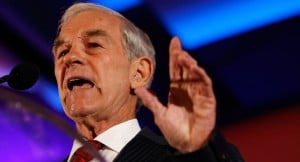 Republican presidential candidate Ron Paul has amassed a loyal legion of followers. Congressman Paul’s libertarian-leaning views on domestic issues seem to resonate with many voters. For the record, I like Congressman Paul. However, his views on foreign policy are very skewed. Nevertheless, Paul’s isolationist rhetoric has gained traction amongst the war-weary, especially within the younger demographic. With over 6000 Americans killed and over 47,000 wounded in Iraq and Afghanistan over the last 10 years, it is easy to see the appeal of Paul’s message–no more military interventions abroad. Paul further proposes to shut down all overseas U.S. military bases and return all U.S. troops to Fortress America. While this argument appeals to isolationists, this approach would only leave the playing field open for economic and strategic rivals of the U.S. The message Paul preaches has some validity, but it also operates under the premise that the U.S. exists in a vacuum and very much clouds the real problem with U.S. foreign policy.
Republican presidential candidate Ron Paul has amassed a loyal legion of followers. Congressman Paul’s libertarian-leaning views on domestic issues seem to resonate with many voters. For the record, I like Congressman Paul. However, his views on foreign policy are very skewed. Nevertheless, Paul’s isolationist rhetoric has gained traction amongst the war-weary, especially within the younger demographic. With over 6000 Americans killed and over 47,000 wounded in Iraq and Afghanistan over the last 10 years, it is easy to see the appeal of Paul’s message–no more military interventions abroad. Paul further proposes to shut down all overseas U.S. military bases and return all U.S. troops to Fortress America. While this argument appeals to isolationists, this approach would only leave the playing field open for economic and strategic rivals of the U.S. The message Paul preaches has some validity, but it also operates under the premise that the U.S. exists in a vacuum and very much clouds the real problem with U.S. foreign policy.
The U.S. has taken a lead role in “Westernizing” the world. What is important to note, however, is that the U.S. no longer maintains economic hegemony in the world. New innovations in communication, transportation, and information technology have leveled the playing field. Rivals such as China are jockeying for position in underdeveloped markets throughout the world. They are not only looking for markets for their goods and services, but they also hunger for the natural resources that many of lesser developed countries possess. The West in general and the U.S. in particular, have long been demonized as purveyors of materialism. Godless mercenaries peddling their wares and forcing their ideology on all they come in contact with. This plays right into the hands of the low-profile Chinese, who have been quietly expanding their global footprint. While the U.S. and its Western allies wage wars in the Middle East and Asia, the Chinese are forging close ties with countries like Pakistan. Despite the billions of dollars that the U.S. is pumping into Afghanistan and Pakistan, it is the Chinese who will be best positioned to benefit from any newly-generated resources and economies in the region.
The real danger of Congressman Paul’s message is that it is far too light on foreign policy and thus, projects the wrong image. Defining military intervention as U.S. foreign policy is a page straight out of “Anti-American Propaganda 101” and only confuses the issue. No doubt, the U.S. needs to be much more judicial with its use of the military and have a cogent plan for a stepped-up use of diplomacy. However, the mere presence of our military overseas fulfills a critical foreign policy objective–power projection. The use of Realpolitik has served the U.S. well in dealing with the likes of China and the former Soviet Union, without ever firing a shot. The distinction needs to be made between military presence and military intervention. Moreover, although the military can be a tool of foreign policy, it should never define U.S. foreign policy. The biggest foreign policy problem for the U.S. is perception. If the U.S. is to ever maintain its place in the world and not be outpaced by the Chinese and others, it must improve its image. Most political pundits do not give Paul much of a chance of becoming the Republican nominee. Nevertheless, Congressman Paul has the ear of America for the time being and as such, a huge responsibility. By all means, speak your mind. However, be aware of your impact on your followers–perception is reality.